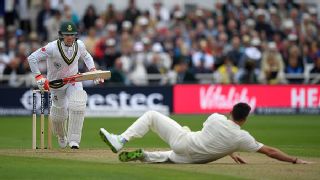|
A week is a long time in politics, they say. It's both much shorter and much longer in sport. For supporters, in a week an entire squad should be changed, a coach replaced and a mindset shifted. After South Africa's defeat at Lord's, half the batting line-up were under scrutiny, there was increased interest in Russell Domingo's position especially with his reapplication still under consideration and concerns that the disappointments of a long and largely unsuccessful trip to the UK were haunting even the mostly successful Test outfit. For the squad concerned, that week was about long day after long day of trying to fix what went wrong without overhauling the system. Practically they cannot pick as many new players as public opinion demands, neither can they change the management and while they can reframe their approach a little, they can't actually alter what is often spoken about as a "brand" of play in such a short space of time. They know that they will have to take a similar group of players and the same support staff and aim for a different result. So how exactly did South Africa achieve that? A lot can be put down to the basics, both in selection and team performance. South Africa dropped their worst performing batsman from Lord's, JP Duminy, swapped out another batsman, Theunis de Bruyn, for an allrounder, Chris Morris and had their captain Faf du Plessis back. The changes gave them more stability in the line-up and more options in the attack. They also did not bowl a single no-ball at Trent Bridge after overstepping 10 times at Lord's and took all their catches in Nottingham after putting down four in London. Those things were not done by the flicking of a switch or the taking of a scolding but by focusing on two key things. "One was character. The style of play we normally have is one with a lot of character and intensity and good body language," du Plessis explained. South Africa pride themselves on their ability to bounce back, which has its own problems because it means they have to be behind first, but it has allowed them to develop thick, resilient skins. They were reminded of that after their drubbing at Lord's. The second thing was how they respond to pressure. "In the first Test, we played some good cricket but at times that went missing a bit," du Plessis said. "It's important how long and how well we can do that because it puts pressure on the opposition and then also, when you are under pressure, to make sure how you respond to those moments to get the pressure back on the opposition."  South Africa's batsmen built steadier partnerships than England by playing the patience game and their bowlers broke through England's attacking approach. As a unit, South Africa could dictate terms throughout the match. "Pretty much from the toss to the last ball that we bowled, we were in control of this Test match," du Plessis said.
South Africa's batsmen built steadier partnerships than England by playing the patience game and their bowlers broke through England's attacking approach. As a unit, South Africa could dictate terms throughout the match. "Pretty much from the toss to the last ball that we bowled, we were in control of this Test match," du Plessis said.
Even when du Plessis chose to bat first in conditions most other captains, including the home one, would have bowled in he was confident his men had it covered. "We knew it would be tough but and we are used to making those brave decisions," he said. "Back in South Africa we prepare green wickets and we're not scared of batting first. For England to only get one wicket and us to get 56 runs in that session set the tone." Then they promoted their best batsmen to No.4 and it paid off handsomely. Quinton de Kock's sprightly 68 gave the first innings life. Though he failed in the second innings, South Africa are set to stick with him higher up and allowing him the freedom to continue playing a naturally aggressive game. "It wasn't a case of making a decision that's just a once off, I'm a big believer, in giving guys a fair opportunity," du Plessis said. "We all know that the way he plays is the way he plays, so we are not going to ask him to change that. He's going to put pressure on the opposition and he's a good enough cricketer to understand when to adapt his game to play certain situations, so he'll learn a lot from this." The batsmen and the conditions gave the bowlers enough to work with but even after removing England for 205 in the first innings, du Plessis was preparing to play a long game in search of a series-levelling victory. "A lot of people might have thought we had enough runs long before we did, but for me it was crucial we got 450-plus to make sure it looked like a really big total because the pitch was still good," he said. "We weren't expecting it to be easy. We were mentally preparing to take it to lunch or even tea tomorrow." That the win came mid-way through the day was a welcome bonus for a South African side that wanted to be challenged. They spent a week preparing for a fight, because both they knew that any small slip up in the second match would turn the entire tour on its head. The Test series would be un-winnable; the trip irredeemable. Now they have more than a week before they go again. It's a long time in sport, both long enough for England to forget and long enough for South Africa to remember.
|
